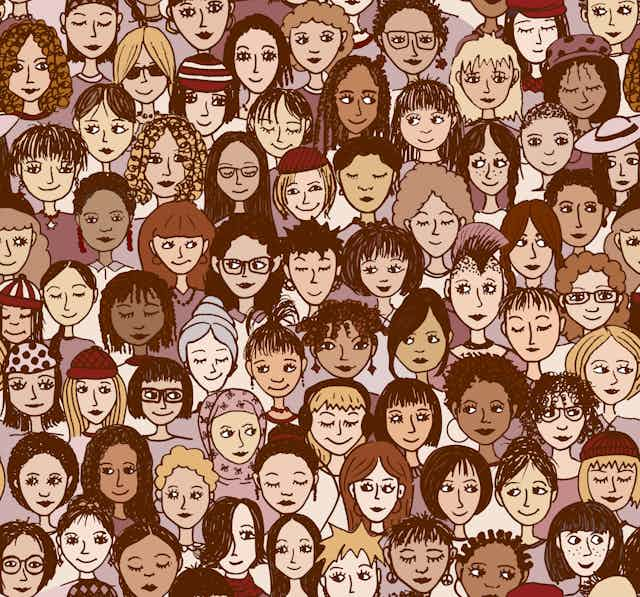Faced with religion, what’s a good feminist to do? Some strongly reject religion of all kinds as oppressive to women, while others celebrate faith as part of human diversity. Others try to forge a middle ground. But sometimes feminists can wade into complex religious debates without a full understanding of their history and context – and the impact of their intervention.
Feminists need to understand the complexities of religion rather than swapping a blanket condemnation of religion for a blanket embrace – they need to develop better religious literacy.
A row in November 2015 at Goldsmiths College in London provided a useful example of why. The university’s Atheist, Secularist and Humanist Society invited secularist feminist activist Maryam Namazie, spokesperson of the Council of Ex-Muslims of Britain, to give a talk on “Apostasy, blasphemy and free expression in the age of Isis”. Students from Goldsmiths Islamic Society tried to block Namazie’s visit. They wrote to the Atheist Society saying that Namazie was “renowned for being Islamophobic” and her presence would violate their “safe space”.
The Atheist Society went ahead with the event. Namazie spoke, criticising Islamism and showing a satirical cartoon from the weekly comic strip “Jesus and Mo”. Some male Islamic Society students disrupted the talk by laughing, heckling, walking around and playing with their phones. One made a gesture that a lecturer present interpreted as a death threat. This film shows what happened.
Afterwards, Goldsmiths Feminist Society issued a statement that said they were “in solidarity with Goldsmiths Islamic Society” and that “hosting known islamophobes at our university creates a climate of hatred”.
They were severely criticised. Detractors pointed out that the Islamic Society had hosted some controversial Muslim speakers and argued that feminists should not support religious groups who curtail women’s rights. Free speech, not censorship, should be promoted, said others.
Feminist responses to religion
Feminist and Islamic societies are no easy bedfellows. It’s fairly remarkable to see feminists supporting religious people at all. Feminists since the 1960s have mostly ignored religion as irrelevant or condemned it as oppressive.
But things have changed. In 21st-century Britain, religion is simultaneously supported and stigmatised. Legislation accords religious people increased rights. Yet some religious groups are still stigmatised. Some Muslims have been targeted by government policies such as those aimed at preventing violent extremism and attacked by racist individuals who decide to blame them for the actions of terrorists, while Jews have been subject to rising rates of anti-Semitic hate crime.
Those who argue that a “good” student feminist should support a downtrodden religious group, should realise that student religious societies have a poor record on gender equality. Across the UK, the largest Christian society on university campuses, the Christian Union, invite female speakers far less often than male ones
It’s similar for the Islamic Society. Research has highlighted how some Muslim students steer clear of university Islamic societies because they view them as too conservative. The Islamic Society doesn’t represent all Muslim students, just as some liberal Anglicans might question the virgin birth rather than enter a Christian Union meeting.
What’s on the blogs
The Goldsmiths case isn’t isolated. I analysed ten years of posts about religion on popular British feminist blog The F Word and found a similar lack of religious literacy. Posts about religion were most often about Islam – odd, given that just under 5% of the British population are Muslim.
Almost all of these expressed support for Muslim women, mostly focusing on why women’s choice to wear the hijab was a good thing. When they wrote about Christianity, it was negatively, condemning its political power (for instance, bishops having a say on abortion law). They rarely blogged about any other religion. In ten years, there was only one post on Buddhism and Hinduism.
The F Word bloggers are determined, rightly, to support Muslim women and challenge those who disrespect them. But working out how to further gender equality and religious freedom surely requires more than simply endorsing every expression of Islam or stereotyping Muslim women as being interested only in what they wear on their heads. Religious and spiritual women are diverse – Jewish, Sikh, Hindu, Catholic, Sunni, Shia, pagan, agnostic – and atheists, ex-Muslims, secular Jews and ex-Christians deserve an equal hearing.
Thankfully, some feminist bloggers are religiously literate and The F Word does contain some excellent posts on religion. These articles’ positive representation of Islam also offer a welcome contrast to the mainstream British media.
Improving feminists’ religious literacy
It’s great that feminist blogs and campus feminist societies are starting to think about faith. But if we want to create societies where gender equality and women’s religious lives are taken equally seriously, we need to improve the quality of the conversation about religion among feminists.
We need to raise feminists’ religious literacy. This must involve what sociologists Sarah Bracke and Nadia Fadil call “a collaborative conversation in which excluded and marginalised perspectives are highlighted”.
Campus feminist groups and feminist blogs show great potential to host such conversations, but it will require work and commitment to create and sustain them.

